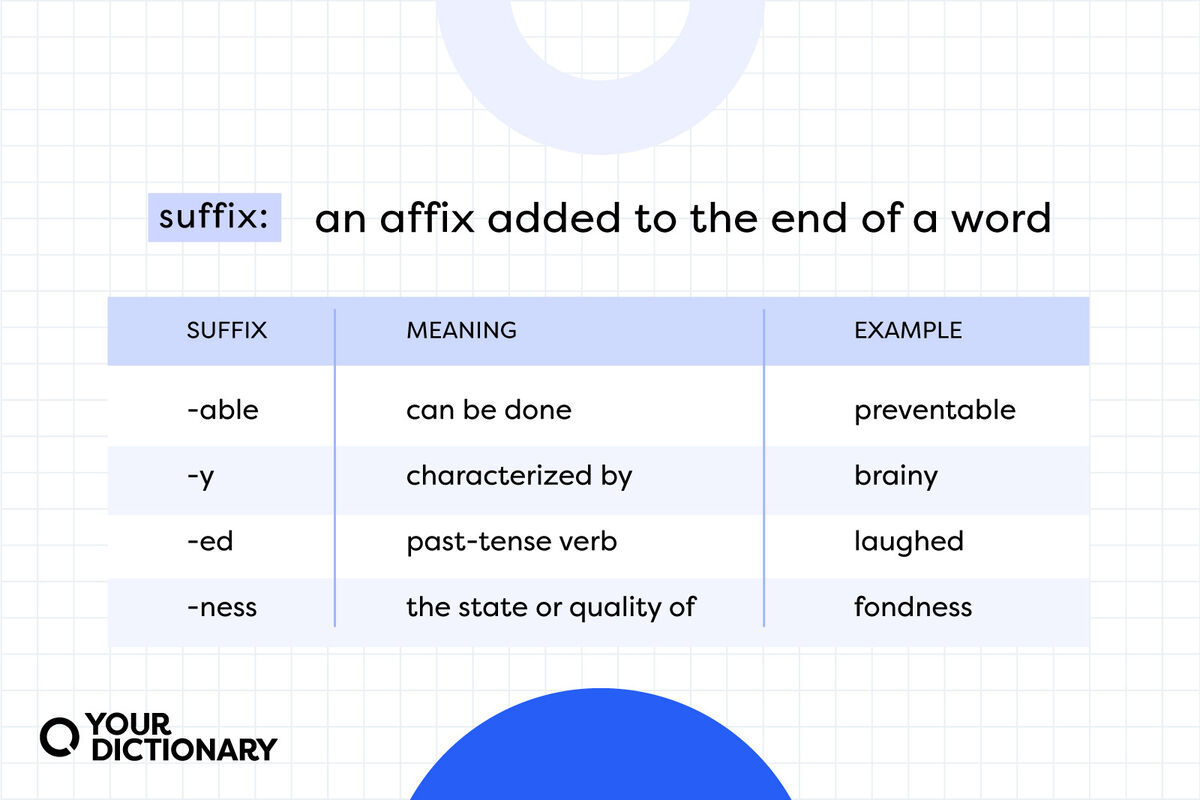Examples of suffixes
Suffixes are letters added to the end of a base word to change its conjugation, examples of suffixes, word type, or other grammar properties like plurality. For example, take the noun strength : You can add the suffix — s to make it plural strengths or the suffix — en to change it into a verb strengthen. You can examples of suffixes add the suffix — ed to make that verb past tense strengthened.
A suffix is a letter or group of letters added at the end of a word which makes a new word. The new word is most often a different word class from the original word. In the table above, the suffix - ful has changed verbs to adjectives, - ment , and - ion have changed verbs to nouns. If you see a word ending in - ment , for example, it is likely to be a noun e. Often, the suffix causes a spelling change to the original word.
Examples of suffixes
Adding affixes to existing words the base or root to form new words is common in academic English. Prefixes are added to the front of the base like dislike , whereas suffixes are added to the end of the base active activate. Prefixes usually do not change the class of the base word, but suffixes usually do change the class of the word. The most common prefixes used to form new verbs in academic English are: re-, dis-, over-, un-, mis-, out-. The most common suffixes are: -ise, -en, -ate, - i fy. By far the most common affix in academic English is -ise. The most common prefixes used to form new nouns in academic English are: co- and sub-. The most common suffixes are: -tion, -ity , -er, -ness, -ism, -ment, -ant, -ship, -age, -ery. By far the most common noun affix in academic English is -tion. Suffix added to a verb V , noun N or adjective A noun.
Notice how each example derives from a root word eg.
How knowing common suffixes can help you understand what words mean. A suffix is a letter or a group of letters attached to the end of a word to form a new word or to change the grammatical function or part of speech of the word. For example, the verb read is made into the noun reader by adding the suffix -er. Similarly, read is made into the adjective readable by adding the suffix -able. Understanding the meanings of the common suffixes can help you figure out the meanings of new words you encounter. In some cases, the spelling of a root or base word changes when a suffix is added.
Suffixes are letters added to the end of a base word to change its conjugation, word type, or other grammar properties like plurality. For example, take the noun strength : You can add the suffix — s to make it plural strengths or the suffix — en to change it into a verb strengthen. You can then add the suffix — ed to make that verb past tense strengthened. Suffixes play a major role in English, not only in grammar, but also in writing and reading comprehension. In this guide, we explain the rules and share examples of the most common suffixes in English. Give your writing extra polish Grammarly helps you communicate confidently Write with Grammarly.
Examples of suffixes
How knowing common suffixes can help you understand what words mean. A suffix is a letter or a group of letters attached to the end of a word to form a new word or to change the grammatical function or part of speech of the word. For example, the verb read is made into the noun reader by adding the suffix -er.
Vanossgaming skin
To help you learn why and when this happens read suffix spelling rules. Avoiding common mistakes with verb patterns 1 February 21, By registering you get free access to our website and app available on desktop AND mobile which will help you to super-charge your learning process. We also use third-party cookies that help us analyze and understand how you use this website. Use profiles to select personalised advertising. Suffixes are a big part of English grammar and an understanding of suffixes is essential for more varied language use. What are the two types of derivational suffixes? Infinitives with and without to Infinitive: active or passive? Farther , farthest or further , furthest? Ten cat s are not enough! Measure advertising performance. Amount of , number of or quantity of? Maybe or perhaps?
By signing in, you agree to our Terms and Conditions and Privacy Policy. We'll see you in your inbox soon. A suffix is a letter or group of letters added to the end of a word to change its meaning or function.
Perfect infinitive with to to have worked Verbs: basic forms Verbs: formation. Understand audiences through statistics or combinations of data from different sources. Worth or worthwhile? Imagine another balloon is placed in the room. Learn about our Editorial Process. Formal written English uses nouns more than verbs. Just like with verbs, be careful with irregular plural nouns that use unique spellings for plurality. There are two types of suffix - inflectional suffixes and derivational suffixes. Suffixes are essential as they help us to adapt words. The -ly in happily refers to the manner in which an action is performed in a happy way ; t he adjective 'happy' becomes the adverb 'happily'. Adverb suffixes. Adjectives: uncomfortable, unavoidable, unimaginative, inactive, semi-circular.


It is a pity, that now I can not express - it is very occupied. But I will return - I will necessarily write that I think on this question.